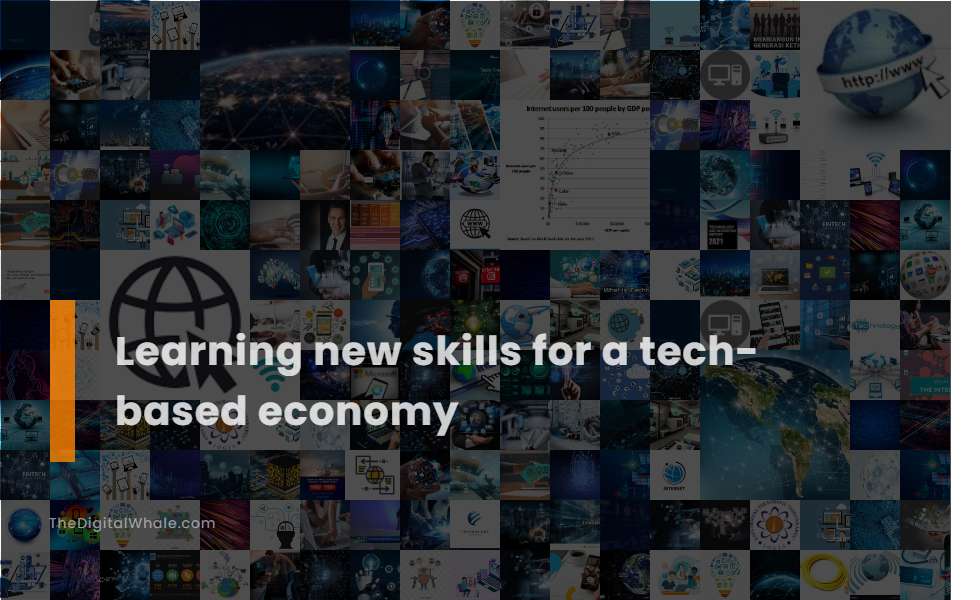Learning New Skills for A Tech-Based Economy
How can I be creative in my work in the creative economy? How can I finesse my way around when learning new technology skills? Let's find out more about Learning New Skills for A Tech-Based Economy.

Analytical Thinking and Innovation
For a tech-based economy, Analytical Thinking and Innovation are crucial skills, as highlighted by the World Economic Forum's Future of Jobs Report. These skills include complex problem-solving, critical thinking and analysis, creativity, and technology use, monitoring, and design, which are essential for adapting to and driving innovation in the digital era. To dive deeper into these future-proof skills, visit the Future of Jobs Report which provides valuable insights and guidance.
Active Learning and Learning Strategies
Active learning in a tech-based economy involves utilizing technology to engage students in interactive and experiential ways. Techniques such as online adaptive tutorials, discussion boards, and hypothesis-testing activities foster substantial engagement and self-paced learning. In this context, methods like Think/Pair/Share, Jigsaw, and Muddiest Point become integral to active learning strategies, encouraging students to be participative through group discussions, individual reflections, and problem-solving activities, both in-class and online. To explore more about these methodologies and their application, visit the Active Learning Strategies page. These approaches are instrumental in transforming traditional learning environments, ensuring that students are not just passive recipients of information but active contributors to their educational journey.
Complex Problem Solving
Mastering complex problem solving in a tech-based economy necessitates honing critical thinking, analytical skills, creative thinking, and robust technical prowess. It is crucial to stay updated with the latest technologies while continuously enhancing coding and troubleshooting abilities. Engaging with resources like the Tech Problem Solving Skills blog can provide invaluable insights. For effective problem solving, embrace research, analytics, rapid prototyping, and feedback to address increasingly intricate challenges. Using an agile approach to adapt to environmental changes and pivot as needed is essential for successful problem solving.
Critical Thinking and Analysis
Critical thinking is essential in a tech-based economy, enabling professionals to analyze complex problems, evaluate alternative solutions, and make informed decisions. It drives innovation, adaptability, and success in rapidly evolving technological environments. In this context, practical exercises and training programs are key to developing these skills. Harnessing the power of critical thinking in tech enhances decision-making and helps professionals solve complex challenges while adapting to quick technological shifts, thereby maintaining an edge in the industry.
Coding and Programming (e.g., Python, Java, JavaScript, C++)
In today's tech-driven economy, distinguishing between coding and programming is crucial. Programming encompasses a broader range of skills such as planning, design, testing, deployment, and maintenance, proving essential for roles like software developer, software engineer, and web developer, which are experiencing significant job growth. Notably, for beginners looking to dive into this field, starting with Python is highly recommended due to its beginner-friendly nature and versatility. Once comfortable, learners can expand to languages such as HTML, CSS, JavaScript for web development, or C++, and Java depending on their area of focus, such as app development or embedded systems. As coding skills, including proficiency in languages like Python, Java, and JavaScript, are becoming indispensable assets across all industries, fostering innovation and efficiency, many turn to coding bootcamps for practical education to meet the dynamic demands of the current marketplace.
Related:
1. What are some of the biggest challenges you face when incorporating technology within your business? What are some of the biggest changes to technology that are happening right now? Let's find out more about Embracing Change: Why It's Important To Stay Ahead of the Curve with Technology.
Data Analysis and Interpretation (e.g., Excel, SQL, statistical analysis)
To enhance data analysis and interpretation skills, managers need to focus on consuming and processing information effectively. It's essential to distinguish between data analysis, which involves finding patterns and trends, and interpretation, which assigns meaning to these findings. By visiting Effective Data Storytelling, one can explore targeted training aimed at improving data literacy and driving data-driven decision-making. Additionally, mastering tools like Excel, SQL, and Power BI, as well as understanding statistical analysis, are crucial for inspecting, cleaning, transforming, and modeling data to discover useful information and support decision-making.
Digital Literacy (e.g., productivity software, communication platforms, project management tools)
Digital literacy involves five key skills: technical skills for using digital devices and software, independent research to gather and assess online information, media literacy to critically evaluate digital content, digital citizenship for responsible online behavior, and communication and collaboration skills to interact effectively in digital environments.
Technology Use, Monitoring, and Control
To thrive in a tech-based economy, individuals must develop skills in Technology Use, such as effectively utilizing various software and tools, as well as Monitoring, which involves tracking performance metrics and analytics to optimize processes. Additionally, Control is crucial, requiring the ability to intervene and adapt technological systems to ensure optimal outcomes.
Creativity, Originality, and Initiative
Creativity, originality, and initiative are crucial skills for the tech-based economy, enabling individuals to come up with innovative solutions, work autonomously, and drive progress through proactive and imaginative approaches. These skills are essential for adapting to the ever-evolving digital era. For more insights on developing these skills, refer to the 15 Skills Of The Future resource provided by Criteria Corp, which offers valuable strategies for thriving in this dynamic landscape.
Resilience, Stress Tolerance, and Flexibility
Resilience, stress tolerance, and flexibility are crucial skills for thriving in a tech-based economy, enabling individuals to adapt to rapid changes, manage stress effectively, and remain productive amidst uncertainty and transformation. These skills are essential for self-management in programming and other fields, helping individuals bounce back from setbacks, stay calm under pressure, and adapt to new challenges and methodologies, ultimately enhancing their problem-solving and learning capabilities.
Related:
Can social media affect mental health? What is the dopamine receptor? Let's find out more about Social Media and Its Effects On Personal Life.
